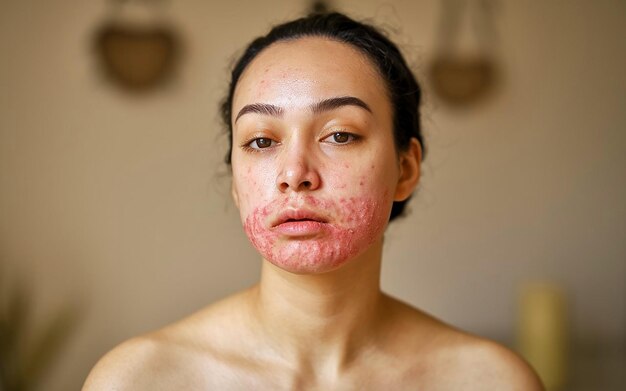Understanding the Role of Irritation in Acne Formation
Can irritation really turn into acne? This question is more common than you might think. If you've ever noticed breakouts following harsh scrubs or irritating skincare products, you're not alone. Understanding how irritation influences acne can help you refine your skincare routine and lead to clearer, healthier skin.
What is Acne?
To understand the relationship between irritation and acne, let's first break down what acne is. Acne is a chronic skin condition that occurs when hair follicles become clogged with oil and dead skin cells, leading to blackheads, whiteheads, pimples, or cysts. It can affect people of all ages but is most common among teenagers.
The Role of Oil and Bacteria
Acne is often associated with excess oil production and the presence of bacteria, specifically Propionibacterium acnes. This bacterium naturally lives on your skin and thrives in oily environments. When pores are blocked, the bacteria multiply, leading to inflammation and acne.
How Irritation Can Lead to Acne
Irritation can indeed play a significant role in acne development. Here's how:
Physical Irritation
Scrubbing and Over-Exfoliating: While exfoliation can help remove dead skin cells, overdoing it can strip the skin of its natural oils, leading to increased oil production as the skin tries to compensate. Excessive scrubbing can cause microtears, creating entry points for bacteria.
Tight Clothing and Accessories: Tight hats, helmets, or clothing can rub against the skin, leading to friction and irritation that may cause acne, commonly referred to as acne mechanica.
Chemical and Environmental Irritation
Harsh Skincare Products: Products with high alcohol content, synthetic fragrances, or sulfates can disrupt the skin's barrier, leading to irritation. A compromised barrier is more vulnerable to bacterial invasion and breakouts.
Pollution and Environmental Factors: Dust, smoke, and environmental pollutants can settle on your skin, leading to irritation and inflammation, which may result in acne over time.
Skin Sensitivity and Acne
Skin sensitivity can exacerbate the effects of irritation. Sensitive skin may react more intensely to irritants, increasing the likelihood of inflammation and acne.
How to Care for Sensitive Skin
- Gentle Cleansing: Use mild, sulfate-free cleansers.
- Moisturize Regularly: Choose non-comedogenic moisturizers to protect the skin barrier.
- Patch Test New Products: Before using new skincare products all over your face, test them on a small area to check for reactions.
Identifying Acne Triggers
Understanding what triggers your acne is crucial for effective management. Common triggers include:
- Hormonal Changes: Hormonal fluctuations can increase oil production.
- Dietary Factors: Foods high in sugar and dairy may contribute to acne for some.
- Stress: Stress can trigger hormone production that increases oil production.
Essential Skincare Practices to Prevent Acne
1. Be Mindful of Washing Techniques Using lukewarm water instead of hot can prevent over-drying your skin. Over-drying can lead to reactive oil production, further exacerbating acne.
2. Opt for Non-Comedogenic Products These products are designed not to clog pores, reducing the risk of breakouts.
3. Keep Your Skin Hydrated Hydration doesn't mean applying thick creams; even water-based products can keep skin supple and healthy.
4. Hands Off Your Face Touching your face can transfer oils and bacteria from your hands to your face, promoting acne.
The Importance of a Consistent Routine
Finding and sticking to a routine that suits your skin type can be transformative. Consistency in using suitable products can soothe the skin over time and reduce irritation-induced acne.
Tailor Your Routine
- For Oily Skin: Incorporate clay masks to manage excess oil.
- For Dry Skin: Use nourishing oils like jojoba or argan.
- For Combination Skin: Balance treatments for different areas of your face.
Evolving Your Skincare Approach
Experimentation is key, as individual skin types vary widely. What works for one person might not work for another.
Adapt to Changes: As seasons change, so might your skin's needs. Adapt your skincare routine accordingly.
Listen to Your Skin: Pay attention to how your skin responds to products and environment changes. This awareness is essential for identifying patterns and making informed choices.
Key Takeaways
- Irritation can contribute to acne, particularly for sensitive skin types or when compounded by other factors like hormonal changes.
- Avoid unnecessary scrubbing and opt for gentle, consistent skincare routines.
- Monitor your skin's response to products, and be prepared to adjust your approach as needed.
- Hydration and gentle cleansing are cornerstones of a routine suited to prevent irritation-induced acne.
- Stress management and dietary adjustments can play supportive roles in maintaining clear skin.
Your journey to clear skin is unique, and understanding the nuances of your skin's reactions to various stimuli will empower you to make the right choices. Remember, patience and consistency are critical.
Quick Tips for Managing and Preventing Acne 🌟
- Choose Non-Comedogenic Products: They won't clog pores 🧴
- Ease into New Routines: Introduce products gradually to observe reactions 🔄
- Monitor Dietary Choices: Be aware of potential food triggers 🍎🥛
- Practice Stress Reduction: Relaxation can help decrease breakouts 🧘♀️
- Stay Hydrated: Proper hydration supports healthy skin 💧
These strategies will help you manage triggers effectively and work towards a clearer complexion.

